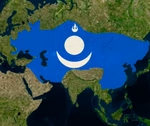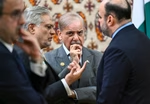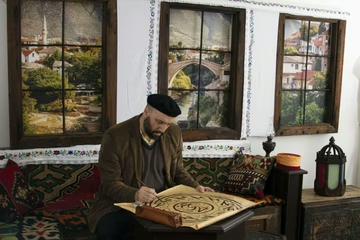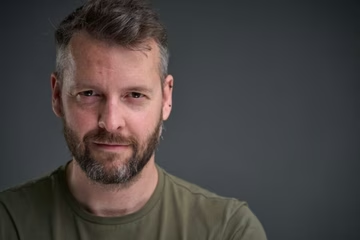
Russian Foreign Ministry's Spokesperson, Maria Zakharova, tweeted the Ministry’s support for the formation of the commission to probe what happened in Srebrenica during the 1992-1995 war, and in Sarajevo.
“We welcome setting up independent international commissions in Republika Srpska (Bosnia and Herzegovina) to investigate crimes against all peoples in Srebrenica and Serbs in Sarajevo between 1991 and 1995,” Zakharova wrote.
https://twitter.com/mfa_russia/status/1113791389920309249
“We note that establishing the commissions is directly related to obvious shortcomings in the activities of the ICTY and the International Residual Mechanism for Criminal Tribunals,” she tweeted.
https://twitter.com/mfa_russia/status/1113791642786586624
Authorities in Bosnia’s Serb-dominated entity of Republika Srpska have formed the Srebrenica and Sarajevo commissions that would deal with the suffering of Serbs in Sarajevo, as well as all peoples in the eastern town of Srebrenica during the 1992-95 Bosnian war.
The Srebrenica commission consists of president Gideon Grief (Israel) and members: Adenrele Shinab (Nigeria), Yuki Osa (Japan), Roger Bayard (Australia), Zeng Yi (China), Giuseppe Zaccharo (Italy), Markus Goldbach (Germany), Laurence Armand French (USA) and Marija Djuric (Serbia).
Bosnia's main ethnic groups do not have a common stance on the events that took place during the war in the early 1990s. The leadership in the RS never accepted or acknowledged international court rulings that what happened in Srebrenica was genocide, arguing that it was an atrocity that all sides in the war had suffered under.
On July 11, 1995, Bosnian Serb forces overran the eastern Bosnian enclave of Srebrenica and rounded up the town’s Muslim Bosniaks, separated men from women and little children and systematically executed some 8,000 men and boys.
The International Criminal Tribunal (ICTY) for the Former Yugoslavia and the International Court of Justice later ruled that the massacre was an act of genocide.
The RS authorities also deny taking part in some of the mass killings in the capital of Sarajevo, which were attributed to Bosnian Serb forces. This includes the biggest massacre that took place in the then-occupied capital, the Markale massacre.
Both the US Embassy to Bosnia and Herzegovina and the Office of the High Representative (OHR), which oversees the peace implementation in the country, condemned the formation of commissions, saying that this would not help the recognition of truth and reconciliation among peoples.
The International Commission on Missing Persons (ICMP) said that it has already been established that genocide was committed in Srebrenica and that there was “no room for revisionism.”
Israeli historian Gideon Greif who was named as the head of the new commission for Srebrenica said “the research will be professional, and honest. Normal people will accept it. Those others will not accept anything, as they live in a completely different world, but that must not hamper us.”
“We have to have one goal on our mind, and that goal is the truth, and there is only one truth,” he said.
But the truth has already been established in the rulings of UN Courts, renown journalist and chief editor of the ‘Avangarda’ web portal, Dzenana Karup-Drusko, said.
For her, the forming of the commissions represents the gravest assault on the Dayton Peace Agreement, that ended the war in Bosnia, so far and she said she expects the international community to react.
“The goal is to change the story about the past, the character of the war, to make all sides equal, to weaken the position where it is known who the victim and who the aggressor, the perpetrator of the crime is,” she said.
In a statement to N1, the British Embassy to Bosnia said on Friday that a new agreement is required for British forces to continue to be part of the EUFOR mission.
"The ALTHEA Operation provides a significant contribution to the safe environment in Bosnia, and the UK fully supports the objectives of this Operation and the continuation of the mandate derived from UN Chapter VII and the Berlin Plus Agreement,” the Embassy said.
"We will continue to support ALTHEA during the Brexit process, and we also plan to maintain the UK’s contribution to the operation through the agreement on leaving the EU and the future relationship with the block. In the case of Brexit without an agreement, a special agreement will be required to continue the participation of British forces in the EUFOR Mission. We have made it clear to the European Union that we are ready for such an arrangement to ensure the continuity of British participation.”
the EUFOR mission also confirmed that all the states participating in the mission are dedicated to the mission.
“All the EUFOR states, whether EU or non-EU member states are dedicated to supporting the EUFOR in Bosnia. Recently, both France and Portugal returned to the Mission, and the UK has reaffirmed its dedication to the region. The EUFOR remains ready to implement its mission in line with the mandate stemming from Chapter VII of the UN Convention,” the Mission said.
Kakvo je tvoje mišljenje o ovome?
Učestvuj u diskusiji ili pročitaj komentare





 Srbija
Srbija
 Hrvatska
Hrvatska
 Slovenija
Slovenija



























































